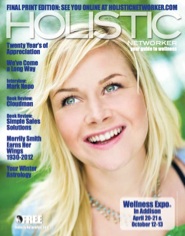Have you ever met a stranger who happened to know one of your close friends? We’ve all had this kind of experience and we think “it’s a small world.” You may also be familiar with the theory there are only “six degrees of separation” between you and any other person on the planet. It’s the idea that you can find a path of six friends or acquaintances that will link you to any person on earth. If you randomly select someone, for instance, the actor Patrick Stewart, you can find a path of friends that will link to him directly. (I’m three links from Mr. Stewart).
The study of the interconnections between people, places, and things is the study of networks, and it’s changing the way we think about the world in fields as diverse as biology, sociology, and economics. Albert-László Barabási has written a fascinating account of the growth of this science in his book, Linked: How Everything Is Connected to Everything Else and What It Means. He describes how the reductionist view of studying smaller parts of things is giving way to understanding the relationships between the parts. This new, holistic approach to science is a fundamental paradigm shift—it is changing the way we think about the world.
For instance, geneticists have decoded the DNA sequence to the human genome. Excitedly, these geneticists tell us that diseases will be decoded from our gene sequences. Reality, however, is more complex; for example, the discovery of “the gene” for bipolar disorder was recanted by scientists when the results could not be replicated. It turns out that illnesses are not caused by a single gene, but rather (you guessed it) by the relationships between several genes.
Scientists now realize that they must study the body in its integrity. Barabási writes, “The behavior of living systems can seldom be reduced to their molecular components.” The molecular approach to science first reached its limits in physics—when it was discovered that particles sometimes act like waves. The other sciences are now facing their molecular limits and are realizing that they can better describe the world in the language of relationships.
Thanks, largely, to the internet, email, eBay and PayPal, people are easily connecting with friends, family, and customers worldwide. Distance no longer dictates whether we are linked with someone; rather it’s our network of relationships that creates a “small world” experience. I believe that it is these interconnections, and not the rhetoric of politicians, that will bring us the world peace we envision.
About Tony Cecala
Tony is a business strategist. He publishes the Holistic Networker and produces the Wellness Expo. In his spare time he reads about technology and the mind.
- Web |
- Flickr |
- More Posts(165)










